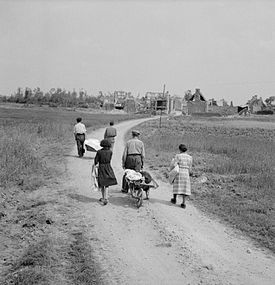Post-war

A post-war period or postwar period is the interval immediately following the end of a war. A post-war period can become an interwar period or interbellum, when a war between the same parties resumes at a later date (e.g., the period between World War I and World War II). By contrast, a post-war period marks the cessation of conflict entirely.
In Western usage,[clarification needed][dubious – discuss] the post-war era or postwar era (sometimes capitalized) is the period of time since the end of World War II,[citation needed] although many nations involved in the Second World War have been involved in wars since.
Post-war
Chronology of the post-World War II era
The term "post-war" can have different meanings in different countries and refer to a period determined by local considerations based on the effect of the war there. In Britain, "post-war" refers to the period from the election of Clement Attlee in 1945 to that of Margaret Thatcher in 1979, a period of so-called post-war consensus, while it may also refer to a shorter period, ending in 1960 or shortly after and corresponding to the 1950s era.[1][2][3]
Cold war era
Considering the post-war era as equivalent to the Cold War era, post-war sometimes includes the 1980s, putting the end at 1990, when the USSR collapsed.[4][5] The 1990s are rarely considered to be part of the post-war era.
See also
- Interbellum (disambiguation)
- Interwar
- Post 9/11 era
- Postbellum
- Pre-war (disambiguation)
- Reconstruction Era of the U.S.
References
- ^ AEC Lorries in the post war years 1945-1979 book (09/10/2011)
- ^ The Post-War Years 1945 - 1960
- ^ The Post War Economy: 1945-1960
- ^ http://www.letsgo.com/12350-europe-travel-guides-the_netherlands-history-c
- ^ Charting Europe's Future in the 'Post Postwar' Era. - Soap Box Discussion Forums and Messageboard - Home of the Patrioteer
